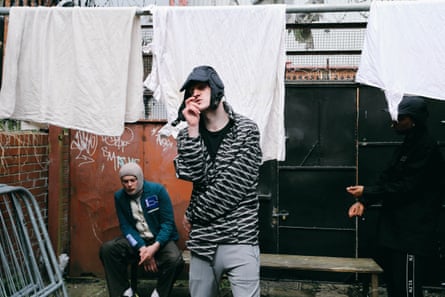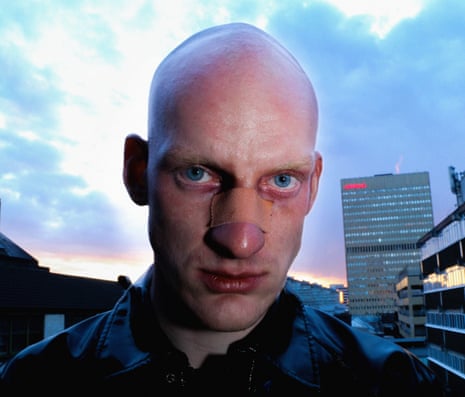First emerging as a surrealist reaction to the horrors of the second world war, the Japanese art of butoh incorporates violence, sacrifice and bodily mutilation: a captivatingly intense form of performance described by its founder Tatsumi Hijikata as the “dance of utter darkness”.
For a teenage Tom Heyes, growing up in dreary, small-town Lancashire, it was an escape from the abject mundanity of his life. “When I was first starting out I didn’t really view it as performance art. It was just me being fucked up in my bedroom,” he says, reflecting on his early interpretation of the craft which drew as much from donk (the north-west’s spin on hardcore dance) as it did the Japanese avant garde. Often he would be left bruised and bloodied from these punishing dance routines, “but those ones back then were the most raw shit ever”, he insists.
Now 25 and operating as Blackhaine (a moniker partly derived from his love of the film La Haine), the unbridled intensity of butoh seeps into every facet of Heyes’ cross-disciplinary creativity: a blistering combination of drill rap, experimental music and contemporary dance that recently got him hired by Kanye West to choreograph his stadium-sized listening parties.
Heyes sips on a Guinness in a salt-of-the-earth pub in Manchester’s Northern Quarter holding its own against a sea of gentrification. “I don’t really have any memories of growing up,” he says with the same endearing Lancashire twang that inflects his music. “I can remember being three and then it’s kind of a blur until I was about 14. Nothing happened for like 10 years. And even when it did, because it was in the context of this dull landscape, it never registered as being exciting. I think I’ve always carried that detachment.”
Born in Preston and raised in nearby Chorley, the ubiquitous bleakness that Heyes references has been his inspiration. “Unless you wanna be a footballer or a fucking gangster or summat, then there’s nothing else to do really. So I just started writing.” A two-year stint working a “dead-end security job” at Leyland train station presented him with ample time.
Citing a wide range of literary influences – from the drug-induced paranoia of Coil to the dissociative prose of Kafka, and Moor Mother’s radical ruminations – he began jotting down whatever came to mind on a knackered iPhone 3, quickly accumulating hundreds of vignettes that resembled one sprawling stream of consciousness. There were no plans to take it further, until fellow Lancastrian artist Rainy Miller convinced him to bring these musings to life.
He sent a cappellas to former classmate Miller, who crafted eerie, metallic drill beats to complement Heyes’ dark meditations and rugged, almost spoken-word flow. The result was Blackhaine’s debut EP Armour: an eloquent exploration of north-western deprivation. “Rigor mortis in my cradle while you’re rocking me to sleep,” Heyes chants on opening track Blackpool, and it’s difficult to think of a better symbol for Blackhaine’s music than the impoverished seaside town; Black Lights on the M6, a nod to the motorway that straddles his native Chorley, has his sparse vocals vying for space amid industrial sounds, conjuring a desolate, monochrome backdrop.

“This is what Sleaford Mods think they sound like,” one of my friends playfully suggested. The socio-politics are certainly more oblique than those of the East Midlands duo, but Heyes’ portrayal of provincial working-class despondency is no less riveting. “When I write I’m more interested in an instinct or an emotion,” he explains. “We’ve surpassed the need for really contrived storytelling.”
A showstopping contribution to Space Afrika’s acclaimed Honest Labour album followed, and Blackhaine’s second EP, And Salford Falls Apart, dropped in December. The title references the city he now calls home, and it builds on the paranoia and angst of his first release. “What’s the price of England now? With Salford falling apart,” is screamed desperately on the title track, a militant assault of harsh noise reminiscent of power electronics agitators Whitehouse. It’s a candid portrait of someone teetering on the edge, and also a comment on what Heyes regards as a nation in decay. “We’re all brought up with this vision of England,” he reflects. “Then we get a bit older and slowly realise that the country we’re living in is a shithole.”
The EP is also semi-autobiographical, with Heyes vaguely alluding to substance abuse (“Me mum’ll read this so I don’t wanna say too much”) and suggesting that he didn’t expect to make it to his current age. The record’s cover art is a photo of his own hospital bed, taken during a close call. “Shaky heart and lungs,” he mutters, deflecting. “But here we are. Happy days.”
Miller is again on production duties, alongside Manchester-based Croww, and the three artists make up the Blackhaine live show. “I’m quite an anxious person day-to-day so when I’m up there that’s when I feel like I can really breathe,” Heyes explains, comparing his visceral on-stage performances to that of another north-west iconoclast, Ian Curtis. “I’m not a technical artist by any stretch but if you put me on stage I’ll fucking go for it,” he says.
Dance remains crucial: what began as a way of “breaking through the detachment” soon blossomed into choreography commissions for musicians such as Mykki Blanco and Flohio. The video for Vegyn’s Nauseous/Devilish, shot on the roof of a multi-storey car park, summarises Heyes’ dance style: he writhes into the most unorthodox of positions, as if fending off invisible antagonists.
He cites an interest in “finding involuntary states of the body” as a guiding principle, and “spice heads” – zombie-like synthetic cannabis users whose presence in Manchester city centre constituted an epidemic in the late-2010s – as an unlikely reference point. “If you put loads of stress on people or interrogate the muscles in a certain part of your arm it will start to shake involuntarily,” he continues. “I find that incredibly interesting. I was researching this and then looking at the spice heads in Piccadilly – while being up to no good in a similar way at the time – and seeing a lot of parallels.”
The high point of his fledgling choreography career came in September, when Kanye West’s team requested Heyes’ services. “I’m not trying to sound arrogant but he’s my hero, innit, and I always knew we’d work together,” he enthuses, recalling sleepless nights spent frantically rehearsing in a dilapidated church in Gorton. “I did think it’d be on the next project when I had a bit more weight behind me, but whatever.”
Heyes modestly suggests that this rapid ascent is the result of him “filling a quota” – a token working-class northerner drawing praise simply for departing from the trust fund, London-centric arts world stereotype. In reality, it’s difficult to think of another artist from any background whose work currently unites so many media with such urgency and profundity. “I think the urgency comes from me saying how I genuinely feel when I go in the booth to record,” he says. “And now that I’ve got the confidence to actually express how I feel, I’m ready to kick on big time.”
And Salford Falls Apart is out now on Head II.
